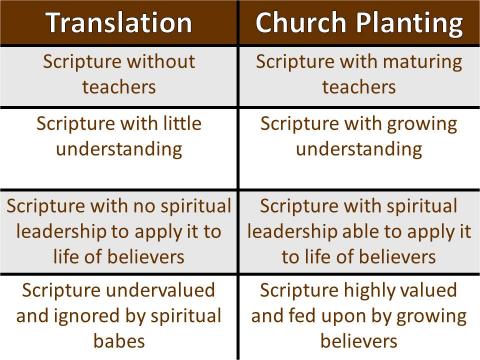PART 3 of 3
IMPLICATIONS
What is the real value of Bible translation? Scripture in the mother tongue is foundational to a maturing church. Though discipleship and church planting take priority, Bible translation is an essential ingredient. A church with no Bible is in danger of crumbling; it lacks a crucial part of its foundation.
The Old Testament is essential. It points to Jesus as God’s coming revelation, redemption, and king. And it can only be truly understood in that light. The Old Testament portrays the character and mission of God, which each church in every culture strives to make their own.
The New Testament is essential. It brings us the record of Jesus as the Word—God incarnate. It contains His will for the church as expressed in His teachings and through His apostles. The New Testament is a faithful guide for any spiritual church in any culture, who wants to grow up into Him as the Head.
But a translated Bible, with no readers, no leaders, and no church, is an insufficient goal. It’s like setting the foundation and proclaiming, “We’ve finished!”
A team with this understanding will not merely focus on translating the Scriptures.
They will teach the Scriptures, and encourage the people to apply the teaching in their lives.
As portions are drafted or translated, these portions will be used by the community or church.
The team will urge the value of reading, and implement literacy strategy from the very beginning.
Teams will work under the direction of churches, since planting churches is the goal.
Team members will value character traits, lifestyle habits, and cultural comprehension as much as technical and language skills.
Deeper questions
With the understanding that Bible translation serves the end of church planting, ABT’s primary focus is those people groups with no Scripture and no church. We refer to these as the “unreached.” However, remember those people described at the beginning of this series? As you can imagine, we face some challenging questions.
-If a group has only a New Testament, does that mean we can check them off the list as “reached”? Some organizations do that.
-If there’s some kind of church in existence, does that automatically mean these people are “reached”? We’ve found reason to occasionally use the term “misreached.”
-How do we respond where an existing translation seems to have been influenced by political or sociological concerns, or a theological bias? Sometimes acceptability trumps faithfulness.
This is just a sampling of the complex issues that arise as we consider where and how God would lead ABT teams to serve. Pray for us, that we keep first things first. As our Translation Philosophy says, “ We dare not let translating the Scriptures become our ultimate priority. Our task is discipling people to become disciples of Jesus.”
--by Aaron Crider, Executive Committee member

